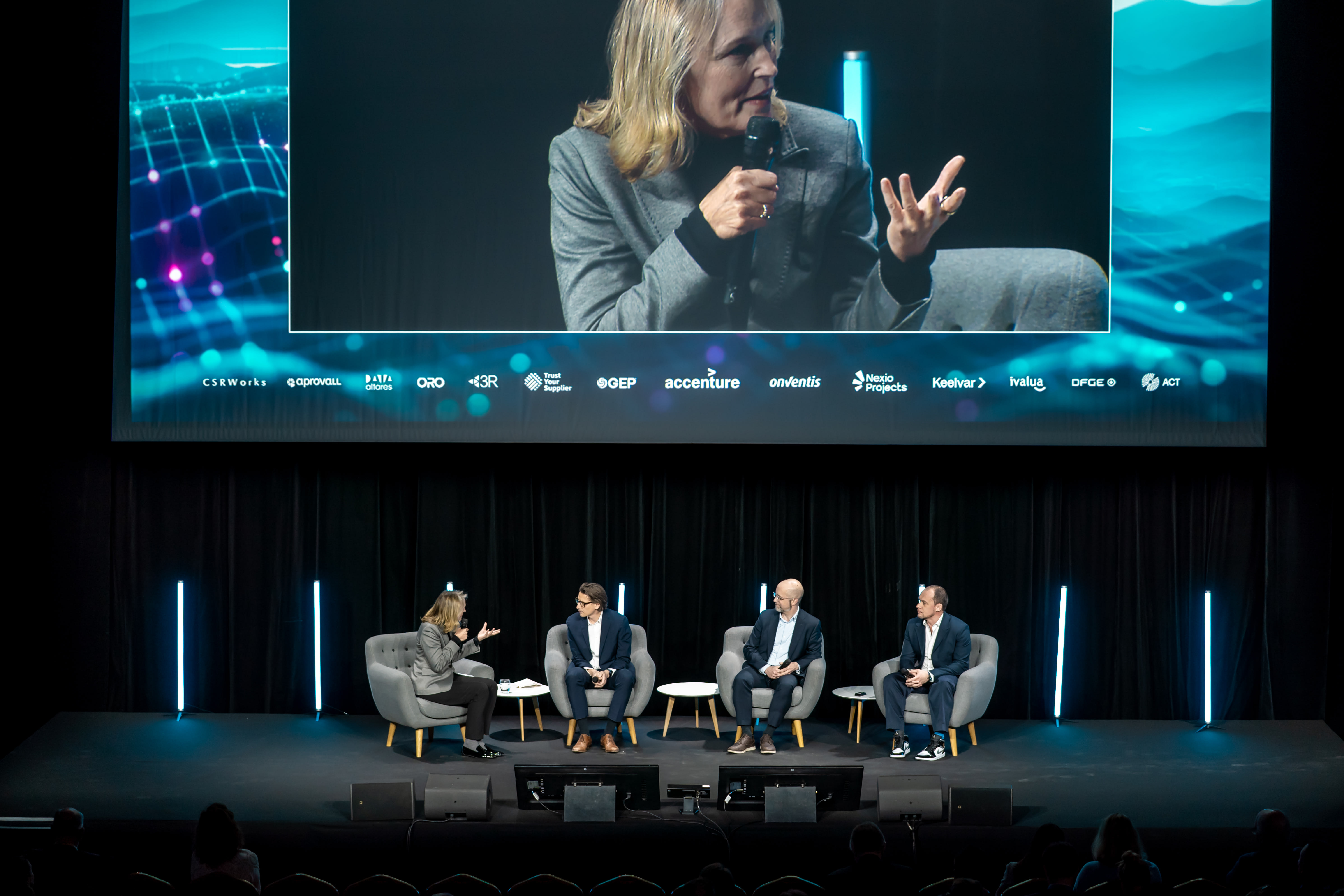Sustain 2025 spotlighted supply chain sustainability, ESG compliance readiness and scope 3 action as keys to business resilience in uncertain times.
We’re in what thought leader John Elkington describes as a “sustainability recession”. Global instability and economic volatility are causing some governments and companies to scale back their ESG commitments and push sustainability priorities to the margins.
But our annual Sustain conference, held this March in Paris, was a powerful counterpoint. With 700 business leaders and sustainability practitioners attending in person – and another 2,400 joining virtually from over 100 countries – the event underscored a critical truth: pulling back on sustainability now will only leave us more vulnerable in the long term. Across inspiring panel discussions and breakout sessions, we heard that the path forward demands stronger collaboration, smarter supply chains and bold leadership that transforms both the how and why of business. Here are three key themes from this year’s event.

| Unlock all the insights from Sustain 2025 – watch every session, on demand now → |
1) Sustainable procurement is delivering resilience and measurable ROI
A standout session at Sustain 2025 was the Executive CPO Panel, which brought together procurement leaders to share real-world insights on how their sustainability efforts are delivering business value. Their message was consistent: in today’s hyper-risk landscape, an effective sustainable procurement program sets you apart from the competition.
The panelists highlighted the benefits of transforming sustainable procurement from a risk-focused function into a strategic engine for resilience and value creation. As Lars Runde, Head of Procurement at Lindt & Sprüngli, explained: “Embedding responsible sourcing into our supply chain design made it more resilient… especially in crisis moments.” This required gaining visibility of their vast cocoa supply to the farm level, assessing farmer practices and investing in regenerative agriculture and long-term sustainability programs. These efforts helped the company better navigate last year’s widespread disruptions across the global cocoa supply chain.
“Embedding responsible sourcing into our supply chain design made it more resilient… especially in crisis moments.”
For leading companies, sustainability is becoming tightly interwoven with innovation and profitability goals. “In our company, you cannot do either performance or sustainability – you have to do both,” said Gianluca Colombo, CPO at dsm-firmenich. He emphasized that delivering on these goals requires having the right ESG data – and integrating it effectively into procurement decision-making. Colombo and his team work to maximize cost-saving opportunities while continually requiring suppliers to improve their sustainability performance (measured through EcoVadis Ratings). The approach is paying off: “We over-delivered. In just two years, we delivered [on our] three-year target on procurement synergies.”
Stéphane Delbos, CPO at Coty, discussed innovation and how applying a sustainability lens is helping his company create products with better market fit and a lower footprint. In his words, “When you start the discussion speaking about sustainability and product desirability [rather than cost]… the output is amazing.” Delbos pointed to the removal of a metal plate from inside the Calvin Klein Euphoria fragrance bottle, a signature product in his company’s portfolio. This simple tweak enhanced customer perception, reduced product emissions by 22%, delivered cost-savings and, perhaps most importantly, generated momentum around similar efforts across the organization.
The shift is also influencing supplier behavior. “Some of our big suppliers that were not as attentive to sustainability started speaking sustainability with us,” said Colombo. “It became a competitive advantage for them to go the extra mile… they became much more serious about their ratings and SBTi commitments.”

2) Regulatory uncertainty shouldn’t stall ESG transparency and progress
Some of the most compelling conversations at the event centered on recent shakeups in the ESG regulatory landscape. The EU’s Omnibus Simplification Package, and its implications for mandatory sustainability reporting and due diligence, were a hot topic across several sessions.
In the Human Rights Due Diligence in a Time of Uncertainty panel, former Vice-President of the European Parliament Heidi Hautala joined Antoine Heuty, SVP of Human Rights at Ulula, to discuss the increasingly complex and fragmented ESG landscape. For example, in the US, California continues pushing forward with its climate and human rights initiatives despite federal rollbacks. Turning to the EU's Omnibus debates, Hautala said “In Europe, we had two quite big steps forward, but now we’re at risk of taking one step back.” Heuty highlighted the ongoing regulatory shift in response to greater economic and political uncertainty:
“We’re clearly moving away from the ESG agenda toward an agenda of resilience. It’s bringing us back to the basics of why sustainable procurement matters... You can deregulate, but the risks remain. We still live in a climate crisis; there are still 28 million people in forced labor.”
The Omnibus Simplification Package panel featured Fredré Ferreira from EFRAG and Dan Dionisie from the European Commission's Directorate-General for Justice and Consumers. They discussed the high-level objectives of the Omnibus proposal and debates around tradeoffs between competitiveness and delivering on the goals of the European Green Deal. Dionisie highlighted this balancing act: “It’s not a black-and-white situation; it’s a matter of balance. How far can you go in reducing the burden – simplifying things – without sacrificing the original objectives?” The EU Omnibus Package Unpacked explored the proposed changes in more detail, including the 80% reduction in CSRD's scope (from 50,000 to roughly 10,000 companies), the narrowing of the CSDDD's due diligence requirements to tier 1 suppliers and the elimination of EU-wide civil liability provisions.
A clear call-to-action emerged across sessions: companies that want to lead over the long term should double down on ESG reporting and due diligence even in the face of regulatory uncertainty. According to Julie Slot Andersen, an APA to a Member of the European Parliament:
“Reporting isn't just about compliance. It’s a tool that will help companies review and adapt their business models to the reality we’re in now – and give them a strategic advantage in an economy where [investors], consumers and employees are demanding green and purpose-driven companies.”
The session, Navigating CSRD with IQ Plus, explored how EcoVadis solutions are helping companies do this by turning compliance readiness into a driver of resilience and business value.
3) Scope 3 decarbonization is a catalyst for innovation and resilience
The urgent need for global supply chain decarbonization took center stage at Sustain 2025. Speakers emphasized that scope 3 reduction efforts do more than address the climate crisis – they’re also driving innovation, enhancing resilience and creating competitive advantages. In the Carbon Data Journey session, Matias Pollmann-Larsen from Accenture called carbon “the sustainability currency,” emphasizing that leaders are capitalizing on this by investing in carbon strategies and leveraging the latest technology to implement them.
Procurement functions are crucial in this strategic shift to drive sustainability and innovation alongside cost control. In the Driving Carbon Emission Reductions session, Jean-Gaetan Guillemaud of Zuellig Pharma explained that effective decarbonization “creates long-term value and [demonstrates to] customers the resiliency, reliability and agility they're looking for.” Anne-Laure Green talked about how Kimberly-Clark has integrated EcoVadis’ Carbon Action Manager into its procurement processes, enabling the prioritization of sustainable practices that yield measurable decarbonization outcomes.
Effective scope 3 decarbonization depends on collecting emissions data from suppliers. Aiden Curry from Hitachi Rail emphasized the urgent need to act on this challenge: “Don’t wait until data is perfect. Start now, start collecting data, and start improving it over time.” While getting started is critical, Amelia Nunn from BD highlighted the importance of being strategic: “Don’t measure for measuring’s sake… we needed to refine what we were looking at to understand suppliers’ journeys.”
To support these efforts, EcoVadis unveiled the Carbon Data Network at Sustain 2025. Leveraging our advanced AI-enhanced platform, it facilitates transparent, standardized sharing of high-quality emissions data between buyers and their suppliers. Combined with our Carbon Action Manager solution, it gives companies and data they need to drive emission reductions across their supply chain and turn scope 3 action into a strategic advantage.

The path forward
Set against a backdrop of political and economic turbulence, Sustain 2025 was a powerful reminder of what’s possible when business leaders prioritize sustainability, innovation and collaboration.
In her conversation with John Elkington, Mary Robinson – former President of Ireland and member of The Elders – left attendees with an inspiring message:
“There are millions of us who are trying to move in the right direction. But we’re not connected enough to know our power. So connect, find out who is around you and amplify them… together we can form a huge surge demanding this [sustainable] future that’s just around the corner.”
Check out the rest of the sessions for more insights or schedule a call with us today.
About the Author
Follow on Twitter Follow on Linkedin Visit Website More Content by EcoVadis EN





















